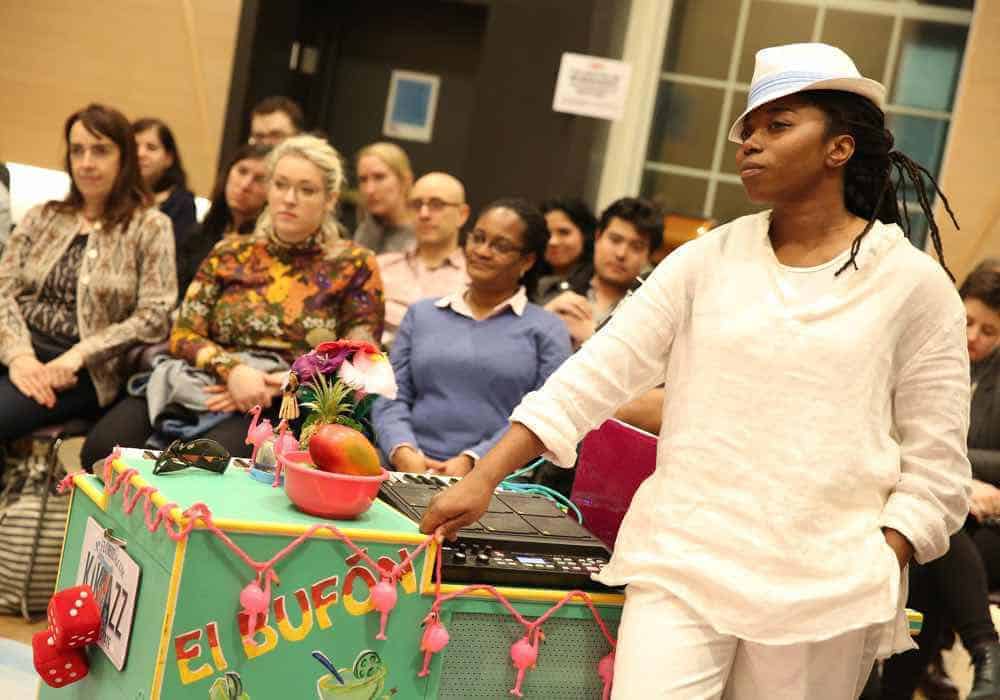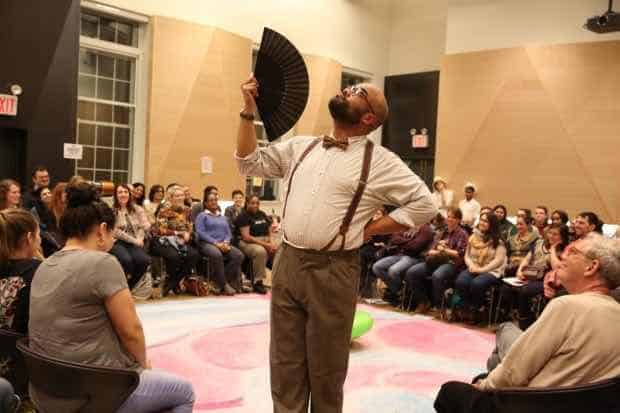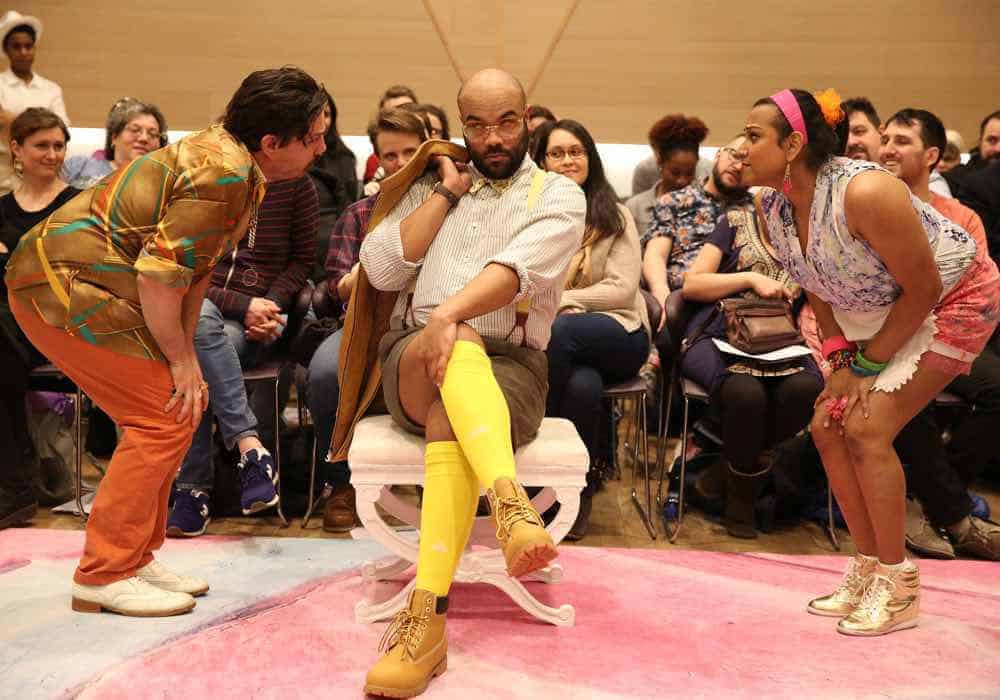The Public Theater Mobile Unit brings Shakespeare’s farcical romance of mistaken identities, Twelfth Night, to prisons, community centers, and more in New York State.

The Public Theatre in New York City is celebrating 60 years of their Shakespearean Mobile Unit with their lively and hilarious production of Twelfth Night, Shakespeare’s farcical romance of mistaken identities. The Mobile Unit creates bare bones Shakespearean productions, with minimal sets, designed to travel to communities outside of New York City to give free access to people who normally wouldn’t be exposed to either theatre or Shakespeare: for example, at correctional facilities or community centres.
As the Mobile Unit performs for audiences with many different socio-economic backgrounds and circumstances the production has to be broadly accessible: it’s a significantly pared down production with a 90-minute runtime and many scenes excised for simplicity and clarity. Director Saheem Ali relocates the action from Shakespeare’s fictional Elizabethan Ilyria to 1990s Florida. To engage an audience of potential theatre neophytes, Ali stages the play in the round to allow direct interaction between the actors and audience. The result is a joyous, atmospheric, modern production.
[clickToTweet tweet=”Ali stages the play in the round to allow direct interaction between the actors and audience.” quote=”Ali stages the play in the round to allow direct interaction between the actors and audience.”]

A young woman named Viola (Danaya Esperanza) washes up on the Florida shore from a shipwreck. Thinking that her twin brother, Sebastian (Sebastian Chacon), is dead, she disguises herself as a man named Cesario in order to work as a servant for Count Orsino (Michael Bradley Cohen). Orsino is in love with the countess Olivia (Ceci Fernandez), and Viola delivers his lovesick messages to her. However, when Viola realizes that she is beginning to have feelings for her master at the exact same moment Olivia grows fond of Viola’s manly disguised Cesario, calamity and farce ensues.
[clickToTweet tweet=”Ali uses sound and costumes to vividly conjure up his setting of Florida in the nineties.” quote=”Ali uses sound and costumes to vividly conjure up his setting of Florida in the nineties.”]
Because an intricate set is not feasible for a traveling production, Ali instead uses sound and costumes to vividly conjure up his setting of Florida in the nineties. Splashing sounds and plastic float tubes mark some scenes as at the poolside. Composer Michael Thurber adapts the music within the play to familiar, contemporary melodies: Feste, Olivia’s clown (played with down to earth humour by Donnetta Lavinia Grays), sings to the track of Will Smith’s “Miami”, and even Cesario’s ballad to Orsino sounds like an Enrique Iglesias love song. The costumes by Dede Ayite are simple but bright and tropical: Maria (lively played by Aneesh Sheth) wears an acid-washed jean skirt with a bright fluorescent pink hairband, and drunkard Sir Toby wears cheesy floral patterned shirts with shorts. As actors doubled up on roles, Ayite makes costume changes as quick as pulling on a hat — emphasizing the artifice. The outfits recall clothes the audience themselves might have worn in the recent past.

Ali takes this relatability one step further by having the actors directly interact with the audience, both in and out of character. As the audience enters and takes their seats, the actors mill about the makeshift stage out of character and mingle with the audience — like clowns breaking the fourth wall. This creates a relaxed party atmosphere of fun. The audience is in the round on all four sides and the playing space is in the center. In one particularly hilarious scene, the audience becomes a part of the set and the action, heightening the comedy and our involvement. When the members of Olivia’s household — Maria, Sir Toby, and Sir Andrew Aguecheek — try to hide from the stuck up Malvolio (David Ryan Smith) so they can watch their scheme to make him behave strangely unfold, they hide behind a blow up palm tree and bend their bodies forward and backward. Eventually, the trio skirts across one side of the first row in the audience, hiding behind patrons’ purses and scarves. Even the costume changes, which transform actors from one character into another, happen just behind the audience, to make us feel like we’re in on the joke.
Listen: We discuss Trevor Nunn’s film and the Globe’s all-male production of Twelfth Night on the 21st Folio podcast here >>
Because Spanish is America’s unofficial second language, Ali’s decision to add a Spanish translation to Shakespeare’s text was inspired: a great way to bring the romantic language of Shakespeare’s poetry to a broader American audience. But it too often interfered with the clarity of the text. For example, Danaya Esperanza’s Viola needed to recite her lines in alternating English and Spanish, using a lispy Spanish accent, which meant she couldn’t always articulate her words. This is a real shame: physically and emotionally, Esperanza is a very capable actor, but clarity should have come as a first priority — especially for an audience new to the Bard.
Theatre Review: Simon McBurney’s The Encounter has to be experienced live

To keep the audience buoyed by laughter, Ali made sure the scenes moved at a rapid pace. Olivia (Ceci Fernandez) progressively gets physically flirtier and sillier in every scene with Cesario. As her romantic feelings amp up, her delivery becomes sharper, and her movements accelerate like a latin dancer in the middle of a competitive dance number. This cartoonish style of comedy worked within the context of this production. The very tall David Ryan Smith is incredibly pompous and uptight as Malvolio, and he is especially funny when he parades and sashays around proudly, with a forced smile, in his ridiculous cross-gartered yellow stockings.
Given Ali’s emphasis on drawing out the comedic elements of the play while excising much of the rest, it was jarring that after using Malvolio primarily for farce, he chose to keep the one very dark scene with Malvolio in the cellar. It was cruel and goes too far into the darker aspects of the play, making it at odds with the overall lighter tones of this production.
[clickToTweet tweet=”‘One female inmate in the audience said this production made her feel like a human being again.'” quote=”‘One female inmate in the audience said this production made her feel like a human being again.'”]
Despite some slight failings, this Twelfth Night production makes the audience roar with laughter and leaves you with a bright smile on your face when it finishes. Mobile Unit fulfilled its mission of making Shakespeare welcoming and transformative for everyone: One female inmate in the audience said that this production made her feel like a human being again. There’s no better compliment to the power of theatre.
Doubles and disguises reign in Desdemona Chiang’s excellent As You Like It at CalShakes

